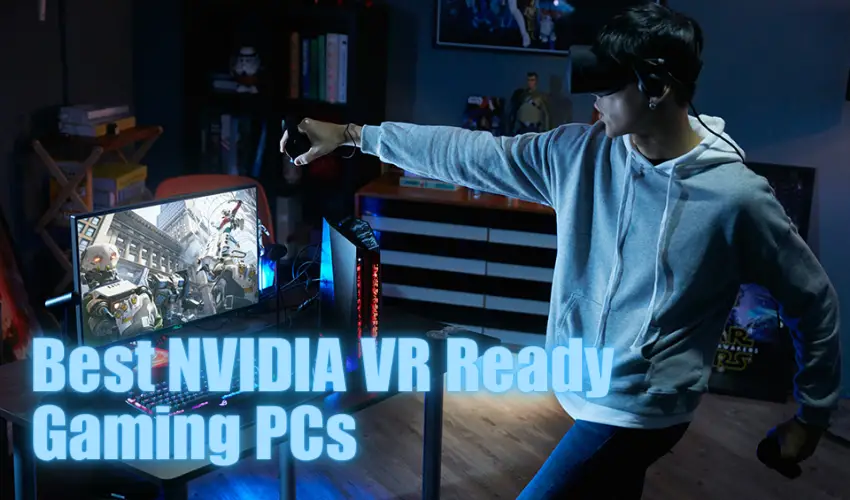
The continuously advancing VR tech showcases a promising future for gaming, one that may very well become a mainstay in the gaming landscape.
While gaming consoles have dedicated VR kits that pair well with the native hardware, it’s PCs that offer you the largest selection of gaming titles. And best computer setups keep the loading times low and gaming immersion high.
Modern gaming PCs have become powerhouses in their own right, and they come equipped with powerful processors and graphics cards. And few names are as well-known in the graphics card scene as NVIDIA.
So, if you’re looking for a gaming PC that has a VR-ready NVIDIA graphics card, take a peek at our top recommendations. These put power directly in your hands, creating a VR experience that suits your fancy.
7 Best Products Reviewed
1. HP OMEN 30L
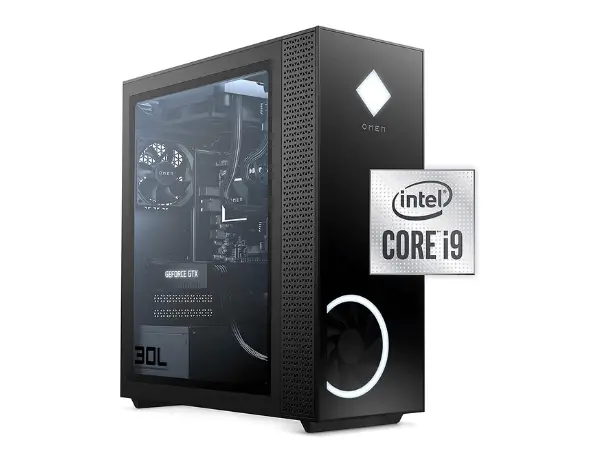
Armed with an NVIDIA RTX 3060, the HP OMEN 30L has significant power output for any modern AAA gaming title of your choice. The CPU is ready to play right out of the box, with a six-core AMD Ryzen 5 5600G processor and 16 gigabytes of DDR4 RAM. And with a terabyte of SSD and HDD storage each, gaming titles will load quickly with little downtime in between loading screens.
These specifications are mostly adequate for any VR title of your choice as well. Rather than being a workstation-focused computer, the PC aims for a consumer market and is priced appropriately low. It comes with a metal chassis with a semi-transparent tempered glass panel on one side to showcase the inner components highlighted by the inner lights. And the PC comes with several USB ports that span several generations, simplifying how you position the VR sensors.
Drawback
The OMEN 30L features limited cooling, which may lead to the device heating up rapidly during intense gaming sessions.
Verdict
High power output coupled with an affordable price tag makes the HP OMEN 30L one of the top recommendations on this list. Its fast loading times and large number of USB ports on both front and rear help make the VR experience seamless and smooth.
2. Alienware Aurora R14
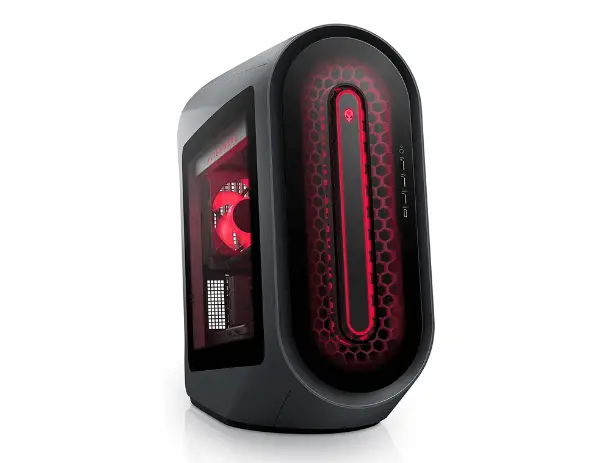
The Alienware Aurora R14 is a gaming PC that puts emphasis particularly on cooling its hardware to ensure it isn’t damaged after long play sessions. With an NVIDIA RTX 3080 graphics card and a 12-core AMD Ryzen 9 5900 processor, the R14 packs ample power for modern gaming titles. And the 32GB DDR4 RAM and 1TB SSD storage further improve upon the gaming experience.
The hardware can pair with a VR headset that supports SteamVR, and the specifications are well above what a VR kit requires. It comes with an array of USB ports in the front and rear of the device for easy sensor setup, with more in the back. Topping it all off, the Alienware Aurora R14 hardware is upgradeable, allowing you to make additions as you see fit in the future.
Drawback
The Alienware Aurora R14 is a bit expensive and may leave your wallet feeling quite a bit lighter post-purchase.
Verdict
The Alienware Aurora R14 is a gaming machine with enough power to run most VR titles without any issues. Moreover, its upgradeable and customizable hardware makes it versatile as more titles are released in the future.
3. Lenovo ThinkStation P620
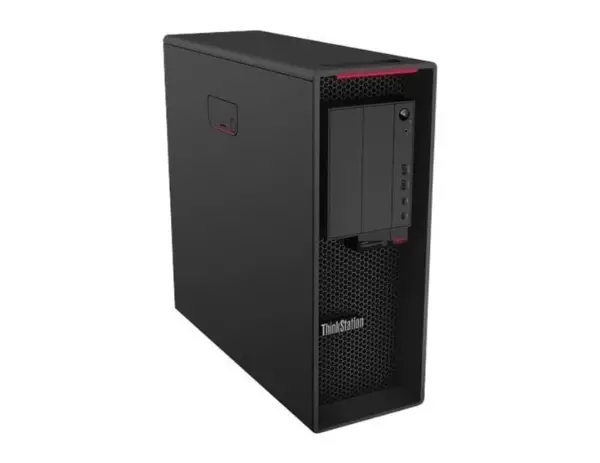
The Lenovo ThinkStation P620 is a workstation that doubles as a gaming PC, with its high processing power and powerful graphics card. It comes equipped with an AMD Ryzen Threadripper PRO with a modest 12-core count and 32 GBs of DDR4 RAM. To complement the processor, the P620 comes with a 12 GB NVIDIA RTX A2000 graphics card, which enables the PC to run modern titles well.
These specifications are fully customizable to cater to your tastes, which makes its performance and price flexible. This includes the 1TB M.2 SSD storage for fast loading times, which can be customized and expanded to your liking. For VR, these specifications are capable of creating a cohesive gameplay experience, no matter the gaming title or the headset.
Drawback
Custom builds can take a lot of time to assemble, requiring up to weeks for an upgrade or reassembly.
Verdict
With expandability in mind, the Lenovo ThinkStation P620 was designed to be a mainstay workstation and gaming PC for the foreseeable future. It is capable of high power output and creating an experience with high frame rates and visual fidelity, which is what a VR setup needs.
4. Falcon Northwest Talon
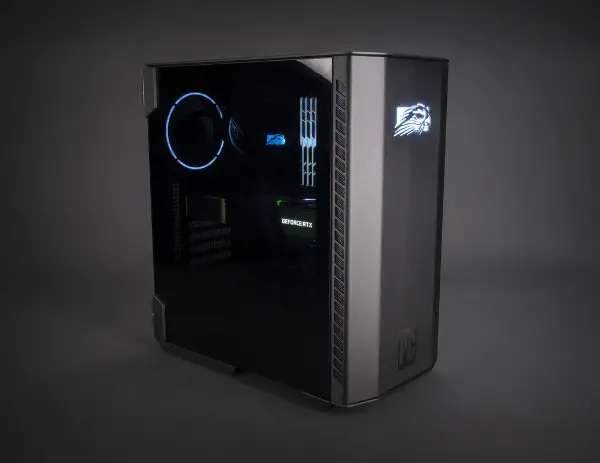
As far as customizability goes, the Falcon Northwest Talon prioritizes it above all else. But this also means that there is no single specifications sheet for the Talon, as you configure the PC yourself before placing the order. Each option you pick increases its price, and the resulting combination is a powerful gaming PC that is VR-ready from the get-go.
Talon can be configured with the Intel 13th Gen, AMD Ryzen 7000, and Ryzen Threadripper Pro processors, each more expensive than the one before. The choice of motherboard, video card, and memory is predicated on the processor, and Talon offers a few options to choose from. For instance, the Intel Core i5-13600K can be paired with an Asus Prime Z790-P motherboard, an NVIDIA RTX 3060 card and Kingston RAM.
Drawback
The customizations can become quite expensive, especially if you choose the higher-end specifications.
Verdict
The Talon is a PC that was designed specifically to run parallel to the current console generation as well as the next. Its high customizability gives it longevity in a field where hardware requires upgrades every couple of years, making it somewhat future-proof.
5. Zotac Magnus One
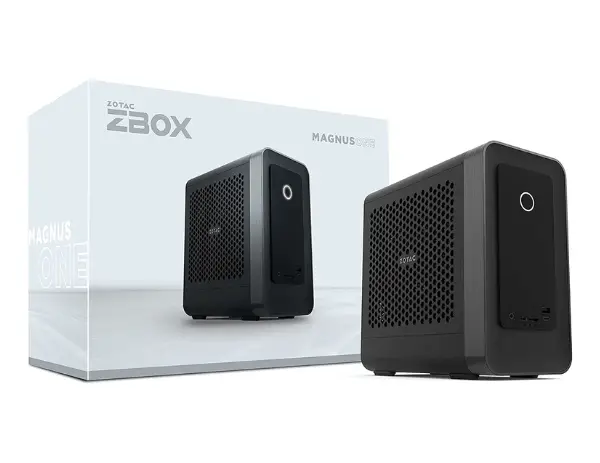
For those who need to take their workstation with them, the Zotac Magnus One is a VR workstation that can fit in a carry case. It is the size of a shoe box and houses enough processing power to support a VR setup without trouble. Inside its chassis is an Intel Core i7-10700 processor with eight cores for fast processing power, 16 GB DDR4 RAM, and an NVIDIA RTX 3070.
Despite its small size and limited cooling fans, the Zotac Magnus One does a fair job at cooling itself. The PC features two USB ports in the front and six in the rear to accommodate any VR setup. And if you prefer customizability, the Magnus One is available in a minimalist configuration that allows the installation of new memory, storage, and OS. Lastly, the Magnus One supports the Oculus Quest headsets right out of the box.
Drawback
The cooling fans can become quite loud during extended play sessions when the unit begins heating up.
Verdict
The Zotac Magnus One offers portability for frequent movers, with decent performance to boot. It remains quite powerful and can handle most gaming titles without a hitch, making it a VR machine with a small form factor.
6. CyberPowerPC Gamer Xtreme VR Gaming PC
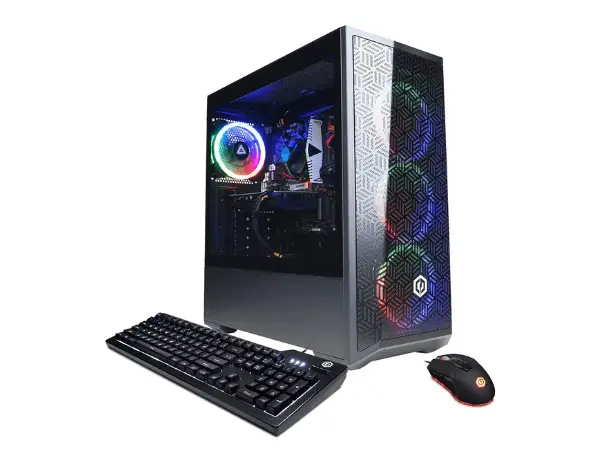
If you’re looking for a budget gaming PC for VR, you may consider looking at the CyberPowerPC gaming PC for a pre-built setup. The brand is a PC builder that uses reputed components and specifications for their devices, from the CPU cabinet to the RAM and processor. As a result, the machine they build has a price tag that is quite low considering the specifications they offer.
The PC we reviewed comes with an Intel Core i5-11400F processor, combined with an NVIDIA GeForce RTX2060 graphics card and 16 GB of DDR4 RAM. It also has 500 GB SSD storage and 1 TB HDD storage, giving you plenty of room to store games and other media. These specifications are a bit meek compared to other entries on the list, but that doesn’t come in the way of the VR experience.
Drawback
The specifications of the CyberPowerPC machine are a bit on the lower end in comparison.
Verdict
The CyberPowerPC Gamer Xtreme VR Gaming PC trades off raw power and performance for a lower price tag. It’s an option to consider if you are on a tight budget and can work with relatively lower specifications.
7. CLX Ra
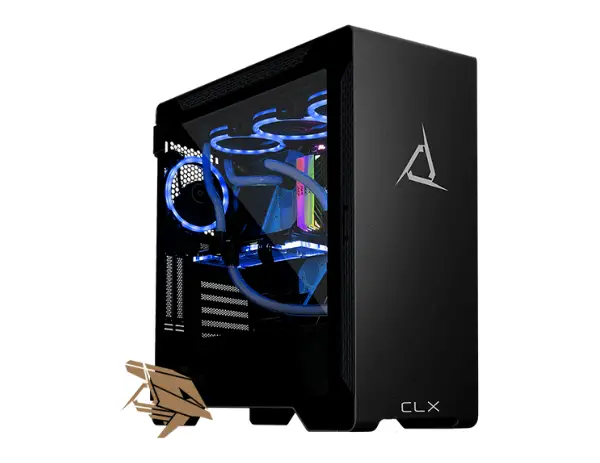
Another option to consider when looking for custom-built PCs is the CLX Ra is a machine built the way you want it to be. Similar to the Falcon Northwest Talon, there is no single specifications sheet since all parts can be customized to the nth degree as per user preference. This includes a selection of chassis, processors that include AMD and Intel, motherboards, NVIDIA and AMD GPUs, RAM, storage, and more.
Thus, it can be difficult to gauge how the PC performs since each user will have a different experience based on the components they choose. But even with the combination of parts that made for the lowest possible combination that we created, the result was still quite powerful and seamless. And with the coolers that CLX provides, the CPU unit was in no danger of overheating.
Drawback
Being a completely customizable high-end PC build, the CLX Ra can set you back quite a bit with a hefty price tag.
Verdict
The CLX Ra is a premium gaming PC that can be fully customized, enabling you to make it a VR gaming PC or a robust workstation. This machine can handle most modern gaming processes with no significant issues.
FAQs
1. Does NVIDIA GeForce work with VR?
Yes, the NVIDIA GeForce series of graphics cards come with VR functionality included with the aim of creating an immersive and smooth gaming experience. They offer plug-and-play compatibility with most VR headsets, with GeForce Game Ready Drivers for enhanced performance.
These graphics cards are steadily advancing, offering support for display resolutions at 4K and more and refresh rates that exceed 90Hz. They also ensure that latency tolerance remains quite thin to keep the seamless experience going.
The GeForce RTX GPUs are used by all the leading VR headset manufacturers and are a part of their testing process. During these testing phases, headset manufacturers try to see what the limits of the hardware are, using the top gaming titles for benchmarking.
2. What is the best NVIDIA driver for performance?
The NVIDIA Game Ready Virtual Reality drivers are optimized specifically for VR, making them the best option in terms of VR performance. These improve gaming performance and decrease latency, both of which are crucial for a smooth VR experience.
NVIDIA Game Ready VR drivers are tested extensively against specific titles, dubbed “Game Ready titles,” the results of which are shared with the game developers. The developers then take this information to fix all the identified issues before deploying the game for launch. As a result, you’ll always receive a VR game that faces few or no issues if it has the ‘Game Ready’ label on it.
A VR-ready driver is only one of the graphics card drivers you’ll need, the other being display drivers or graphics drivers. As a general rule of thumb, installing the latest drivers for your NVIDIA GeForce graphics card is the ideal option for performance and stability.
Now, that’s not to say this has always been true, as particular releases like the 497.29 gave the best performance even after being replaced. That said, this does come with a caveat in the form of reduced stability and increased stutters. So, unless you’re trying to run a specific game that benefits from a particular driver version, sticking to the latest drivers is generally ideal.
Drivers are specific to each graphics card, and to install the correct driver manually, you can access the executable file from the NVIDIA official website. Alternatively, for a more hands-free approach to driver updates, you can simply install the GeForce experience.
NVIDIA GeForce experience will notify you when a new driver is available to download and install. Additionally, you can use this app to tweak your performance in certain games, further optimizing loading times and frame rates.
3. Which NVIDIA driver is best for Elden Ring VR?
If you’ve followed the release of Elden Ring, you probably know that the game does not natively support VR. Despite early PSN listings indicating that the open-world RPG title would have full VR support, there has been no word of it from developer FromSoftware. Suffice to say, there may never be an official Elden Ring VR release.
But that doesn’t mean you can’t experience the Hidetaka Miyazaki creation in VR. All you need to do is own the game on PC via Steam and mod the functionality in. Of course, since the mod is unofficial and is essentially forcing the game into a first-person perspective, the experience is not the smoothest.
The mod is compatible with all PC VR headsets and can be installed within a few minutes. Thus, it only needs the latest drivers compatible with your graphics card and VR headset.
4. Does Oculus use NVIDIA?
Oculus doesn’t use NVIDIA in its VR headsets themselves, typically utilizing an Adreno GPU in the devices.
That said, the devices are compatible with PCs with NVIDIA graphics cards. Through Oculus Link, Oculus headsets can be paired with PCs for a seamless and immersive VR experience.
Oculus Link is compatible with the following NVIDIA graphics cards:
- NVIDIA Titan X
- NVIDIA GeForce GTX 970
- NVIDIA GeForce GTX 1060 (desktop version, 6GB)
- NVIDIA GeForce GTX 1070
- NVIDIA GeForce GTX 1080
- NVIDIA GeForce GTX 1650 Super
- NVIDIA GeForce GTX 1660
- NVIDIA GeForce GTX 1660 TI
- NVIDIA GeForce RTX 20-series (all)
- NVIDIA GeForce RTX 30-series
5. What are the minimum and recommended system requirements for a VR-ready PC?
VR is one of the most resource-intensive processes, and thus, VR gaming requires high PC configurations to work properly. The minimum requirements for a VR-ready PC are as listed below:
- Graphics Card: NVIDIA GTX 970 equivalent or greater
- Processor: Intel i5-4590 equivalent or greater
- RAM: 8 GB or more
- USB Ports: USB 3.0
If your PC meets the following recommended specifications, your VR experience will be smooth and generally seamless.
- Graphics Card: NVIDIA GTX 1070 equivalent or greater
- Processor: Intel i7-6700 equivalent or greater
- RAM: 16 GB or more
- USB Ports: USB 3.0
Final Verdict
Building a gaming PC on your own that can run VR and be somewhat future-proof is difficult and time-taking. Fortunately, there are plenty of pre-built models on the market that are more than capable enough of performing the task.
But if we had to choose between these products, the HP OMEN 30L would be our top pick. It serves as an affordable pre-built VR-ready gaming PC with high performance, low loading times, and ample connectivity ports.
That said, PCs are some of the most flexible products on the market when it comes to performance and bang for your buck. If you’re willing to part with a few extra dollars, you can just as easily choose a PC that is nothing short of a powerhouse.
With VR-ready gaming PCs, you have the freedom of cranking up the specifications sky-high or keeping them within your specific requirements. And this flexibility is what makes you the sole arbiter of which PC is the best option for you.
